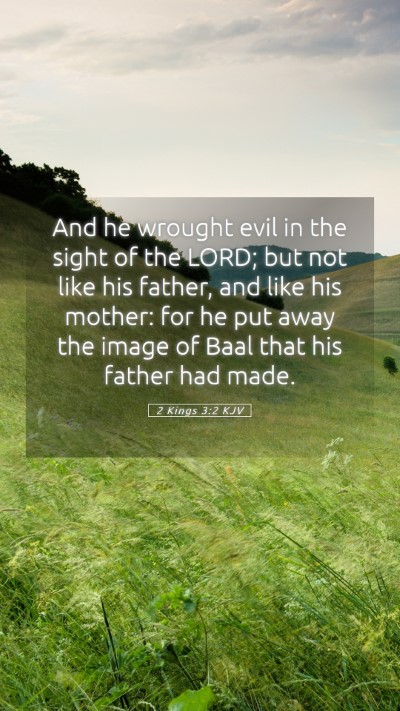Bible Verse Commentary on 2 Kings 3:2
Verse: “And he did that which was evil in the sight of the Lord, but not like his father, and like his mother: for he put away the image of Baal that his father had made.” (2 Kings 3:2)
Overview of the Verse
This verse serves to introduce the character of Jehoram, king of Israel, and sets the stage for understanding his reign. It highlights the complexity of Jehoram's actions, noting both his evil deeds and a significant departure from the idolatry of his parents.
Historical Context
-
The verse is set against the backdrop of Israel's divided monarchy post-Solomon, where Various kings ruled often with conflicting styles and devotion.
-
Baal worship was prevalent, particularly under the reign of King Ahab (Jehoram's father), further complicating the spiritual landscape of Israel.
Insight from Matthew Henry’s Commentary
According to Matthew Henry, this passage illustrates the complex nature of Jehoram's rule. Although he engaged in wickedness, he made a conscious decision to dismantle the idolatrous practices established by his father. This is viewed as a positive step, albeit insufficient, as it reflects the tensions inherent in his leadership.
Insight from Albert Barnes’ Commentary
Albert Barnes reiterates the idea of Jehoram's legacy being mixed; he acknowledges the evil of his actions, yet points out his efforts to eliminate the worship of Baal—suggesting a struggle between his inherited idolatry and a longing towards true worship.
Insight from Adam Clarke’s Commentary
Adam Clarke emphasizes the significance of Jehoram's attempt to erase the idolatrous images. He suggests that while Jehoram did evil, his actions represented a departure from the full-blown idolatry of his lineage, hinting at a struggle for righteousness amid familial pressures.
Thematic Analysis
This verse encapsulates various themes within Scripture, such as:
-
Idolatry vs. Righteousness: The actions of rulers directly impact their nations' spiritual paths.
-
Family Influence: Jehoram's lineage illustrates the enduring consequences of family choices on future generations.
-
Reluctant Reform: Jehoram’s half-hearted removal of idols underscores the challenge of complete transformation.
Application of the Verse
For modern believers, this verse proffers significant lessons:
-
The importance of dismantling sin and idolatry in personal life—even if inherited from past generations.
-
A reminder of the complexities of faith, where intentions may be good, but actions may still fall short of divine expectations.
Bible Cross References
- 1 Kings 16:29-33 - Background on King Ahab’s reign and idolatry.
- 2 Kings 10:28-29 - Further details on the eradication of Baal worship.
- Isaiah 1:16-17 - Call for repentance and true worship, applicable to both Jehoram and believers today.
Conclusion
2 Kings 3:2 serves as a profound reflection on the struggles between legacy and righteousness. Understanding the complexities of Jehoram's actions provides valuable insights into biblical teachings on leadership, influence, and the necessity of sincere worship. For those delving into bible verse meanings, this passage highlights the importance of context and the deep implications of seemingly simple actions.


